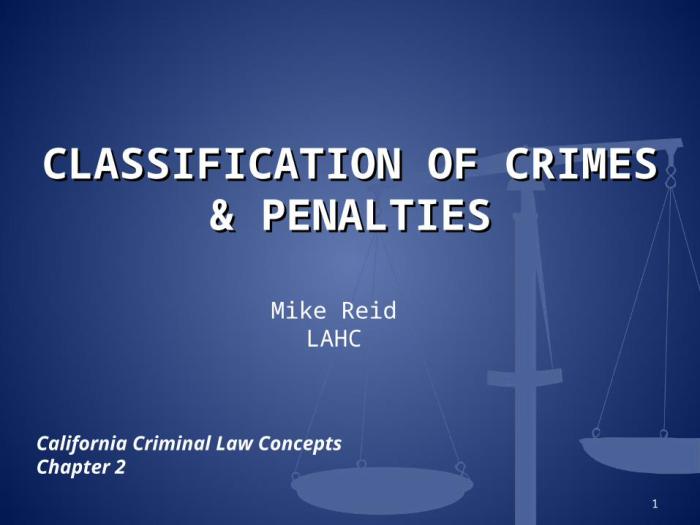California criminal law concepts 2022, a comprehensive compendium of legal principles governing criminal offenses in the state of California, offers a thorough examination of the intricacies of criminal law in this jurisdiction. This article delves into the nuances of felony and misdemeanor crimes, sentencing and probation, criminal defenses, search and seizure, self-defense and use of force, drug crimes, theft and property crimes, domestic violence, DUI and traffic offenses, and juvenile justice, providing an up-to-date analysis of the legal landscape in California.
As California’s criminal justice system continues to evolve, it is imperative to stay abreast of the latest legal developments. This article serves as an invaluable resource for legal professionals, students, and individuals seeking a deeper understanding of California criminal law concepts.
1. Felony and Misdemeanor Crimes

Felonies and misdemeanors are the two main categories of crimes in California. Felonies are more serious crimes, while misdemeanors are less serious. FeloniesFelonies are punishable by imprisonment in state prison for more than one year. Some common felonies include:
- Murder
- Rape
- Robbery
- Arson
- Burglary
MisdemeanorsMisdemeanors are punishable by imprisonment in county jail for up to one year. Some common misdemeanors include:
- Theft
- Assault
- Battery
- Trespassing
- Vandalism
The penalties for felonies and misdemeanors can vary depending on the severity of the crime and the defendant’s criminal history.
2. Sentencing and Probation: California Criminal Law Concepts 2022

When a person is convicted of a crime in California, they are sentenced by a judge. The sentence can include imprisonment, probation, fines, and other penalties. ImprisonmentImprisonment is the most severe type of sentence. It involves being confined in a state prison or county jail.
The length of the sentence will depend on the severity of the crime and the defendant’s criminal history. ProbationProbation is a type of sentence that allows the defendant to remain in the community while under the supervision of a probation officer.
Probationers must follow certain conditions, such as reporting to their probation officer regularly, avoiding contact with certain people, and not committing any new crimes. If a probationer violates the conditions of their probation, they can be sent to jail or prison.
FinesFines are a type of sentence that requires the defendant to pay a sum of money to the court. The amount of the fine will depend on the severity of the crime and the defendant’s financial situation. Other PenaltiesIn addition to imprisonment, probation, and fines, a judge may also impose other penalties, such as:
- Community service
- Restitution to the victim
- Forfeiture of property
Clarifying Questions
What are the key differences between felonies and misdemeanors in California?
Felonies are more serious crimes that are punishable by imprisonment in state prison for more than one year, while misdemeanors are less serious crimes that are punishable by imprisonment in county jail for up to one year.
What are the most common criminal defenses in California?
The most common criminal defenses in California include self-defense, insanity, intoxication, and alibi.
What are the potential penalties for DUI convictions in California?
The potential penalties for DUI convictions in California include fines, imprisonment, and license suspension.
